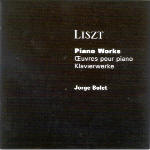Whoever said “an aristocrat never hurries” might well have referred to Jorge Bolet’s Liszt recordings for Decca, now conveniently gathered together in a space-saving, budget-priced boxed set. Bolet was in his mid-60s when he embarked on this series, and he harbored no inclination to outdazzle his younger Lisztian cohorts. His noble, full-bodied sound and elegant reserve largely bypass the showmanship and outward panache we associate with Liszt. Instead, Bolet stresses the composer’s lyric breadth and luminescent textures. As I commented in my earlier review of selections from Bolet’s Decca Liszt output (type Q204 in Search Reviews), climaxes are coaxed from the key beds rather than pounded out. His suave and caressing scales and runs contrast to the fire-and-brimstone pianists such as Lazar Berman and Gyorgy Cziffra serve up in Liszt’s more fierce Transcendental Etudes and the Tarantella from “Venezia e Napoli”. In addition, Bolet’s tempos rarely move faster than Liszt’s arching melodies can be projected by the human voice.
Passages often treated mechanically, such as the unisons at the outset of Mephisto Waltz No. 1, the taxing octave sequences in the B minor Sonata, the so-called “Dante” Sonata, and Orage, and the glissandos in Totentanz, truly sing under Bolet’s fingers. Listen also to the Don Juan Fantasy, where Mozart’s original vocal lines in the central Don Giovanni/Zerlina duet patiently float under and above the elaborate filigree. Similarly, Bolet parses the Petrarca Sonetto and Liebesträume triumvirates in a manner that illuminates the composer’s original conceptions of these works as songs. And the same holds true for the leisurely elegance Bolet brings to a selection of Liszt’s Schubert lieder transcriptions. Besides the aforementioned Totentanz, Bolet’s thoughtfully detailed solo work in the Malédiction and Hungarian Fantasy are complemented by Iván Fischer’s incisive podium support.
Georg Solti and the London Philharmonic also spur Bolet on to inspired heights in Liszt’s recasting of Schubert’s Wanderer Fantasy. A live 1988 performance of the difficult Réminiscences de Norma, based on Bellini’s opera, shows how Bolet could still summon enough thunder to galvanize audiences when he chose. Along similar lines, listeners should note the pianist’s ravishingly nuanced and fleet-fingered Waldesrauschen and Valse-Impromptu. Decca’s booklet notes include Jeremy Nichols’ perceptive and balanced appraisal of Bolet’s Lisztian legacy. You’re guaranteed to profit by investing in this collection, for Bolet’s subtle, seasoned mastery grows on you with each rehearing.
































